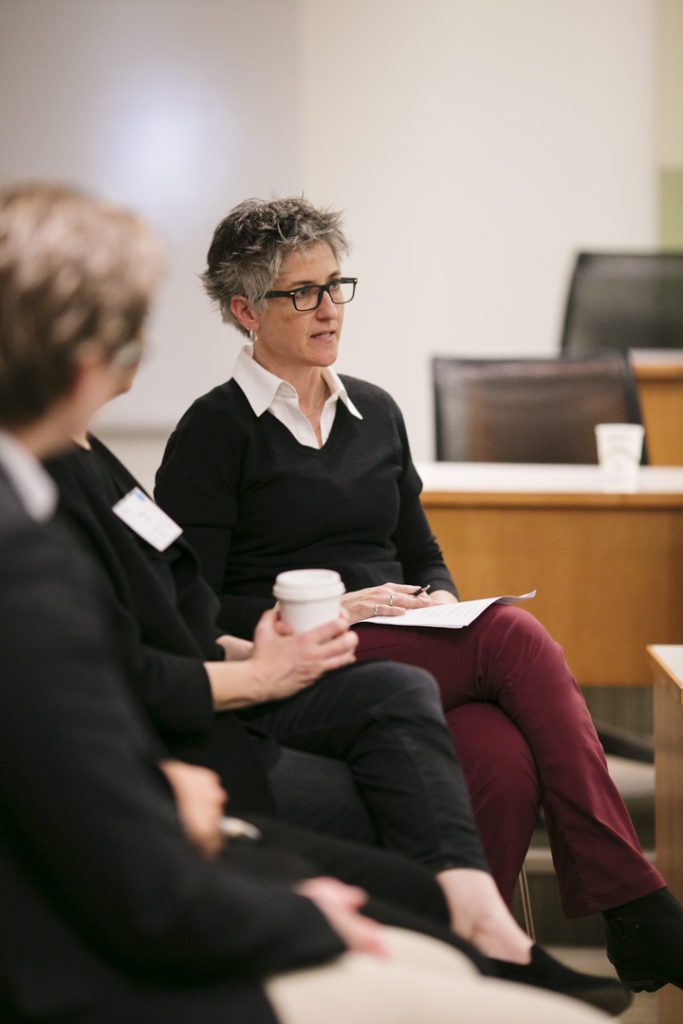What we learned from 100+ digital health CEOs

Each year, we bring together over 100 digital health CEOs for off-the-record discussions about building a healthcare technology company at our annual Digital Health CEO Summit, co-hosted with Wharton | San Francisco and Cowen and Company. We were joined by a diverse group of CEOs from leading digital health companies including Omada Health, Stride Health, Doctor On Demand, PokitDok, Vida Health, and more.
We’re always impressed with the extraordinarily valuable and candid insights shared by the CEOs about their on-the-ground experiences in healthcare. Here are a few select quotes and consensuses that really struck a chord. Due to the candid nature of the conversations, some of the insights are presented anonymously.
1. Be patient. Succeeding in healthcare requires time and money.
- “We didn’t raise $1B for the sake of raising $1B. We did the math—clinical studies of scale are expensive.” – Jeff Huber, CEO, Grail
- Remember: Healthcare is slow. Investors shouldn’t expect the same hockey stick growth that mirrors a pure tech company. “It can take years to get big sales through.”
- Many companies cited the importance of backing up your healthcare product with studies—and their importance for closing funding and securing customers. One caveat: they take much longer than you think they will. “It’s not just about weighing the data from a scientific perspective, it’s also about whether the data will come back in time to properly position the company to achieve critical business goals—launch new products, generate revenue, raise funding, etc,” as Neurotrack co-founder and CEO Elli Kaplan pointed out.
- Similarly, we heard: “The challenge is that value is very gray” to potential customers, who may not be familiar with your product or service and how you will solve a specific problem. Evidence is “fundamental to the business in terms of solidifying the value of the products that you’re building.”
2. Adapt: The rise of consumerism in healthcare continues to shift traditional ways of doing business.
- “We need to make the consumer a superhero and earn the right to help them make decisions.” – Neil Thanedar, co-founder and CEO of Labdoor
- “We caught on very fast organically because the consumer was saving money by using our product, so there was no need to convince people that it would work. If we had to convince them, it would not have taken off as quickly.” – Trevor Bezdek, CEO of GoodRx
- The old ways of sales and marketing in healthcare don’t work anymore. “What you’re seeing now is multimedia and social media.” On how different marketing and communication is required for different employee populations with an organization, CEO of Zipongo, Jason Langheier, made it clear that “personalization and basic segmentation is critical.”
- “If you want to disrupt an industry [like healthcare], you have to do it in a non-disruptive way.” – Sami Inkinen, Founder and CEO, Virta Health



3. Be heard in the Beltway: Being a large company is not a prerequisite for engaging in DC.
- Omada Health Chief Privacy & Regulatory Officer and former ONC whiz Lucia Savage recommended entrepreneurs “pay attention to the regulatory space. That’s a very good way to collaborate. You can share the burden and the knowledge, and then comment on the public information that the government puts out.” Some specific tips: Sign up for the Federal Register, look out for resources from CMS and HHS. Reach out to the ONC. Talk to Washington lawmakers and their staffers. Make sure you share data and real stories about their constituents in their home state. Give them a meaningful snapshot of your company and how you’re helping constituents in their home state.
- Participants indicated that providers and health plans are delaying expenditures based on the belief that future law (whether an ACA amendment or new law) will result in revenue constraints. They also felt that the fanfare around the ACA is a distraction from core issues and policy that healthcare startups should focus on.
- “Many people in government are always looking for innovative ideas. They want input and ideas from the outside. They get excited about new, daring companies. They work from the information they have—what their constituents write in letters and call in to share with them and what they learn in meetings. Your customers are their constituents too. So engagement is key.” – Jamil Poonja, Head of Public Policy and Communications, Stride Health.
- On the connection between ACA and MACRA: “Measuring [meaningful use] and paying for what you measure are not going away.” – Lucia Savage, Chief Privacy & Regulatory Officer at Omada Health
4. Choose the right board and investors: We hear this time and time again.
- Don’t rush to fill your board and risk bringing on the wrong partner or having the wrong board structure. As one CEO said: “It’s like marrying the wrong person. Imagine going to Vegas, getting married, and not being able to get divorced.”
- When taking investments and filling board seats, “Seek a lower valuation to get the man or woman who would be the better partner. The person that is willing to pay the most is probably the most dysfunctional.” Furthermore, “Most businesses don’t talk about valuation. If you spend your time talking about valuation, you’re not taking the time to work on your product.”
- “Your investors do not know the journey you are embarking on. Educate your investors about how long this is going to take. Educate them often and early,” recommended Lisa Maki, co-founder and CEO of PokitDok. Another CEO reminded that investors in healthcare “need to be patient.”
- “If you’re going down the VC route, I don’t think you should raise funding unless you’re ready to sprint.” – Christine Lemke, Co-founder and President, Evidation Health

5. Get paid: Tips for finding a sustainable business model and satisfying enterprise customers
- “Tie engagement to what rings the register. If it’s not tied to revenue, it’s not focusing for you.” – Hill Ferguson, CEO, Doctor on Demand.
- On engagement as a metric: “We’ve stopped talking about engagement [as the only measure of success]. We have enrollment and engagement. It’s getting people to get there in the first place. We’re trying to separate these metrics instead of looking at them together—and this has helped us a lot.”
- Similarly, on success in B2B2C: “You need to build a product that will be engaging. You can’t rely on your customer for that—that’s on you.” Another CEO reminded: “B2B2C marketing is consumer marketing where you don’t actually get to call the shots.” When selling into employers and benefits managers, “The contracting phase is very important. You have to get their commitment upfront to help market your product.”
- “Frontload your customer success function. If you’re not massively successful on that first sale, you’re not going anywhere.”
- Regarding pilots, entrepreneurs commonly say: “Don’t do anything for free.” Try to get the contracting and legal work done up front so you can convert the pilot to a sale if you meet your goals. “Free is valueless.” Remember that pilots aren’t a piece of cake, and they could take nearly a year to be approved. One CEO said, “We had to treat our pilot with a payer like it was a full deployment.”
- Be clear about what your sales funnel is, track it very well, and identify metrics for it to illuminate bottlenecks. Then, of course, drive resources to those bottlenecks.
- Some companies started selling to large self-insured employers and thought it “would not be that painful.” Afterward, they sought out health plans and found the significantly shorter sales cycles (6-9 months as opposed to 3+ years) were much easier to work with.
6. Reach out and help someone: Digital health entrepreneurs continually cite each other as one of their most valuable resources.
- “Best-in-class and complementary startups should work together to have a more comprehensive solution instead of being seen as a point solution.” Multiple companies cited the importance of a trusted network. If you find one, hold onto it.
- One posed, “As entrepreneurs in digital health, how can we work together to lift our industry to help with engagement?”
We couldn’t agree more with the power of a relatively small group of entrepreneurs to change the legacy systems of healthcare.
